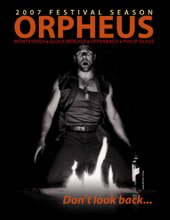All About the Journey: Jill Gardner, Offenbach's Newest Muse
 After a brief illness opening weekend, leading lady Jill Gardner is back in the role of Eurydice in Offenbach's Orpheus in the Underworld. An alumna of Glimmerglass' Young American Artists Program, Gardner earned her bachelor's degree in piano, but decided to focus on voice instead after a fellow pianist recommended a voice teacher whose students he accompanied.
After a brief illness opening weekend, leading lady Jill Gardner is back in the role of Eurydice in Offenbach's Orpheus in the Underworld. An alumna of Glimmerglass' Young American Artists Program, Gardner earned her bachelor's degree in piano, but decided to focus on voice instead after a fellow pianist recommended a voice teacher whose students he accompanied.
Offenbach's Eurydice is unique. In every other Orpheus opera Glimmerglass is producing this season, Eurydice takes a back seat to the heroic Orpheus, the center of the action. Offenbach puts a twist on the myth by placing Euridice as the heroic figure of the story--the only character who doesn't cave to the domineering Public Opinion. Jill sees the character of Eurydice as a multi-faceted, beyond the frivolous veneer usually linked with comic characters.
"It's easy to think that Eurydice is naive, that she doesn't know what she's doing. She's skirting the societal influence, that which is always trying to wield its sword over us in whatever guise. She is the only one that does not operate in this socially influenced way. That's why I find it interesting and that's what I ultimately want to bring to this portrayal, not just someone who sings a ton of high notes." Despite much experience in opera and operetta, Orpheus in the Underworld marks the first comedic role for Gardner, a thrilling challenge for the young soprano. "That's another reason why I found it interesting to try myself out at this. I'm not a big TV-watcher, but I've taken the time to watch some Sex and the City and Seinfeld and even going back to watch I Love Lucy and The Carol Burnett Show. When you sit and watch it totally from the aspect of comedy--not the story, just how they deliver the comedy-- you realize how much real life actually operates in that realm. You see human nature in the most real kind of way. Your instincts are really driven to deliver the comedy in a timing and a specificity that is very multi-layered. This kind of comedic timing is very hard. I have a lot more respect for it than I did.
Despite much experience in opera and operetta, Orpheus in the Underworld marks the first comedic role for Gardner, a thrilling challenge for the young soprano. "That's another reason why I found it interesting to try myself out at this. I'm not a big TV-watcher, but I've taken the time to watch some Sex and the City and Seinfeld and even going back to watch I Love Lucy and The Carol Burnett Show. When you sit and watch it totally from the aspect of comedy--not the story, just how they deliver the comedy-- you realize how much real life actually operates in that realm. You see human nature in the most real kind of way. Your instincts are really driven to deliver the comedy in a timing and a specificity that is very multi-layered. This kind of comedic timing is very hard. I have a lot more respect for it than I did.
"When you're singing all the time, when you have music to suport your words, that already sets up a multi-layered dimension and the music often expresses so well the subjective aspect of a character. You realize with dialogue how much energy's got to be in it and how quixotic we are as human beings." As well as being her first comedic role, this is Gardner's first opportunity to sing a show with her husband Jake Gardner. Jake plays Jupiter, the head god and one of the many men who fall in love with Eurydice. The pair sing the famous "Fly Duet" and share a few romantic moments on stage.
As well as being her first comedic role, this is Gardner's first opportunity to sing a show with her husband Jake Gardner. Jake plays Jupiter, the head god and one of the many men who fall in love with Eurydice. The pair sing the famous "Fly Duet" and share a few romantic moments on stage.
"It's been great. Jake and I have sung quite a bit of concert work and oratorio work together, so it's not like this is the first time we've worked together. We have a lot of respect for one another. There's a lot of give and take in our relationship that's a part of that respect. To be able to have a flirtation with one another as we do in the Offenbach is wonderful. It's fun, not only for us, but for other people as well. You want people to feel enjoyment, happiness, magic, lust, love, flirtation. There are pieces that we'd like to be able to do together where that flirtation isn't there. We'd love to be able to do Carlisle Floyd's Susannah, for instance. I think as long as that mutual respect is there and that we're always reaching for this artistic integrity, that's what guiding us. And then our mission is the same, whatever ego is there or need to control."
"Having this much time to be together with Jake is just nirvana. It's a real gift."




